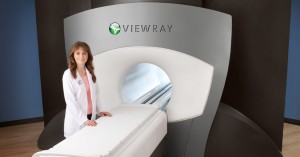 Medical device company ViewRay announced the development of the world’s first on-table adaptive radiation cancer treatment program, which will utilize the MRIdian system. The program will be developed at the Siteman Cancer Center, at the Barnes-Jewish Hospital and Washington University School of Medicine in St. Louis and will feature a combination of both Magnetic Resonance Imaging (MRI) and radiation therapy as a treatment for cancer patients.
Medical device company ViewRay announced the development of the world’s first on-table adaptive radiation cancer treatment program, which will utilize the MRIdian system. The program will be developed at the Siteman Cancer Center, at the Barnes-Jewish Hospital and Washington University School of Medicine in St. Louis and will feature a combination of both Magnetic Resonance Imaging (MRI) and radiation therapy as a treatment for cancer patients.
The treatment is planned to become the first of its kind to use MRI adaptive capabilities in a continuous clinical service in order to provide better accuracy in cancer treatment as well as personalized patient care. The Siteman Cancer Center is the first institution to develop MRI-guided radiation therapy using an MRI system, having treated the first patients last January.
“Based on what one sees on MRI we can now evaluate the change in anatomy or change in dose distribution and then decide if the current plan is sufficient or if an adjustment is necessary” explained Jeffrey Olsen, MD, a radiation oncologist at Siteman Cancer Center and Washington University School of Medicine. “The component of re-planning or on-table adaptive planning is new in radiation therapy.”
“Medicine is moving towards personalized care and we’re proud to have pioneered the most customized approach to radiation delivery available,” stated the president and CEO of ViewRay, Chris A. Raanes. “The MRIdian system was designed to meet the demands of adaptive treatment planning and delivery from its integrated MR imaging and high contrast soft-tissue images to its ultra-fast Monte Carlo dose calculation algorithms. It’s gratifying to see the system enable a unique clinical service that benefits patients.”
[adrotate group=”1″]
The MRIdian’s adaptive abilities are based on MR imaging soft-tissue tracking, as well as real-time treatment planning. Therefore, the system will enable physicians to adjust the therapy recommendations according to their personal disease changes. The MRI will not only allow the improvement of soft-tissue visualization, but it also eliminates X-ray exposure inherent in CT scans.


